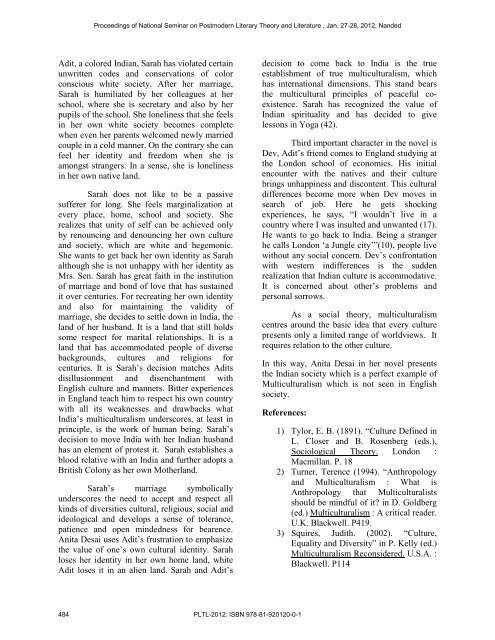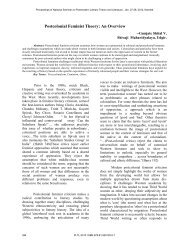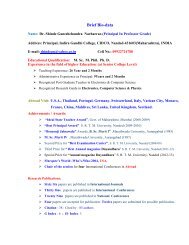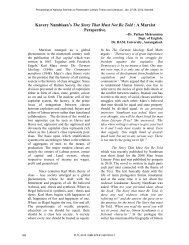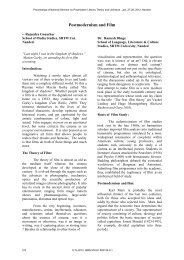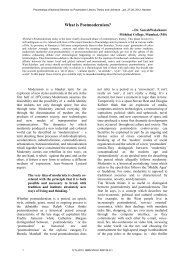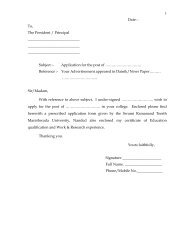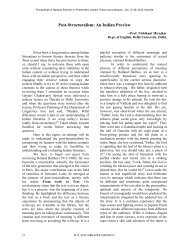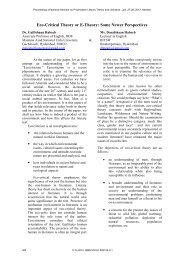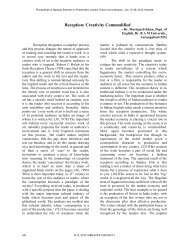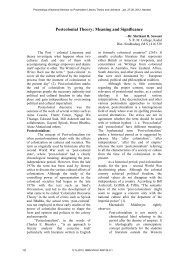Multiculturalism - Igcollege.org
Multiculturalism - Igcollege.org
Multiculturalism - Igcollege.org
Create successful ePaper yourself
Turn your PDF publications into a flip-book with our unique Google optimized e-Paper software.
Proceedings of National Seminar on Postmodern Literary Theory and Literature , Jan. 27-28, 2012, NandedAdit, a colored Indian, Sarah has violated certainunwritten codes and conservations of colorconscious white society. After her marriage,Sarah is humiliated by her colleagues at herschool, where she is secretary and also by herpupils of the school. She loneliness that she feelsin her own white society becomes completewhen even her parents welcomed newly marriedcouple in a cold manner. On the contrary she canfeel her identity and freedom when she isamongst strangers. In a sense, she is lonelinessin her own native land.Sarah does not like to be a passivesufferer for long. She feels marginalization atevery place, home, school and society. Sherealizes that unity of self can be achieved onlyby renouncing and denouncing her own cultureand society, which are white and hegemonic.She wants to get back her own identity as Sarahalthough she is not unhappy with her identity asMrs. Sen. Sarah has great faith in the institutionof marriage and bond of love that has sustainedit over centuries. For recreating her own identityand also for maintaining the validity ofmarriage, she decides to settle down in India, theland of her husband. It is a land that still holdssome respect for marital relationships. It is aland that has accommodated people of diversebackgrounds, cultures and religions forcenturies. It is Sarah’s decision matches Aditsdisillusionment and disenchantment withEnglish culture and manners. Bitter experiencesin England teach him to respect his own countrywith all its weaknesses and drawbacks whatIndia’s multiculturalism underscores, at least inprinciple, is the work of human being. Sarah’sdecision to move India with her Indian husbandhas an element of protest it. Sarah establishes ablood relative with an India and further adopts aBritish Colony as her own Motherland.Sarah’s marriage symbolicallyunderscores the need to accept and respect allkinds of diversities cultural, religious, social andideological and develops a sense of tolerance,patience and open mindedness for bearence.Anita Desai uses Adit’s frustration to emphasizethe value of one’s own cultural identity. Sarahloses her identity in her own home land, whiteAdit loses it in an alien land. Sarah and Adit’sdecision to come back to India is the trueestablishment of true multiculturalism, whichhas international dimensions. This stand bearsthe multicultural principles of peaceful coexistence.Sarah has recognized the value ofIndian spirituality and has decided to givelessons in Yoga (42).Third important character in the novel isDev, Adit’s friend comes to England studying atthe London school of economics. His initialencounter with the natives and their culturebrings unhappiness and discontent. This culturaldifferences become more when Dev moves insearch of job. Here he gets shockingexperiences, he says, “I wouldn’t live in acountry where I was insulted and unwanted (17).He wants to go back to India. Being a strangerhe calls London ‘a Jungle city’”(10), people livewithout any social concern. Dev’s confrontationwith western indifferences is the suddenrealization that Indian culture is accommodative.It is concerned about other’s problems andpersonal sorrows.As a social theory, multiculturalismcentres around the basic idea that every culturepresents only a limited range of worldviews. Itrequires relation to the other culture.In this way, Anita Desai in her novel presentsthe Indian society which is a perfect example of<strong>Multiculturalism</strong> which is not seen in Englishsociety.References:1) Tylor, E. B. (1891). “Culture Defined inL. Closer and B. Rosenberg (eds.),Sociological Theory. London :Macmillan. P. 182) Turner, Terence (1994). “Anthropologyand <strong>Multiculturalism</strong> : What isAnthropology that Multiculturalistsshould be mindful of it? in D. Goldberg(ed.) <strong>Multiculturalism</strong> : A critical reader.U.K. Blackwell. P419.3) Squires, Judith. (2002). “Culture,Equality and Diversity” in P. Kelly (ed.)<strong>Multiculturalism</strong> Reconsidered. U.S.A. :Blackwell. P114484 PLTL-2012: ISBN 978-81-920120-0-1


